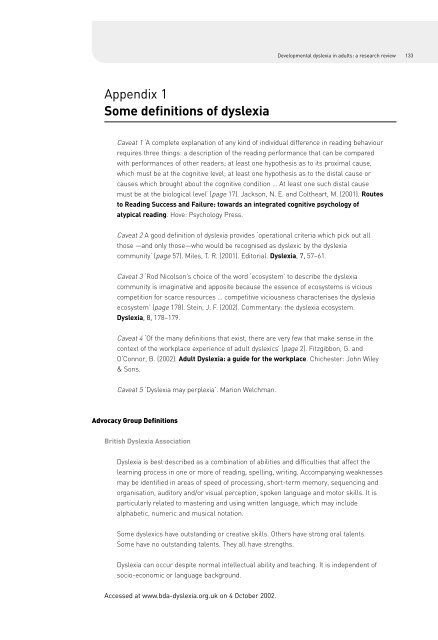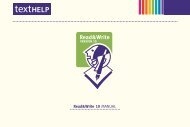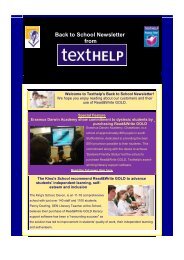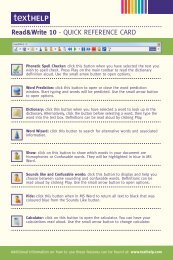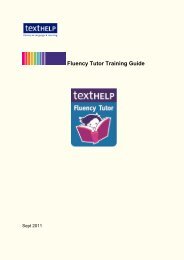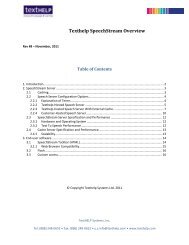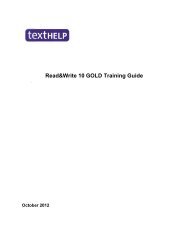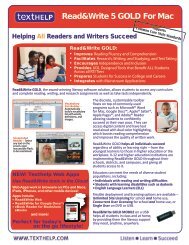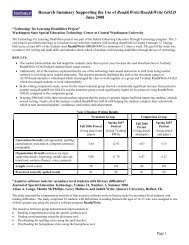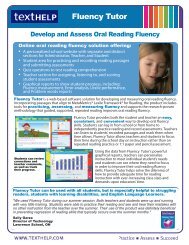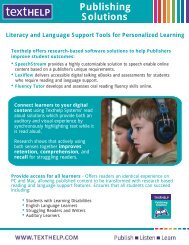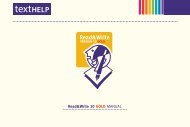01 NRDC Dyslexia 1-88 update - Texthelp
01 NRDC Dyslexia 1-88 update - Texthelp
01 NRDC Dyslexia 1-88 update - Texthelp
You also want an ePaper? Increase the reach of your titles
YUMPU automatically turns print PDFs into web optimized ePapers that Google loves.
Developmental dyslexia in adults: a research review 133<br />
Appendix 1<br />
Some definitions of dyslexia<br />
Caveat 1 ‘A complete explanation of any kind of individual difference in reading behaviour<br />
requires three things: a description of the reading performance that can be compared<br />
with performances of other readers; at least one hypothesis as to its proximal cause,<br />
which must be at the cognitive level; at least one hypothesis as to the distal cause or<br />
causes which brought about the cognitive condition … At least one such distal cause<br />
must be at the biological level’ (page 17). Jackson, N. E. and Coltheart, M. (20<strong>01</strong>). Routes<br />
to Reading Success and Failure: towards an integrated cognitive psychology of<br />
atypical reading. Hove: Psychology Press.<br />
Caveat 2 A good definition of dyslexia provides ‘operational criteria which pick out all<br />
those —and only those—who would be recognised as dyslexic by the dyslexia<br />
community’ (page 57). Miles, T. R. (20<strong>01</strong>). Editorial. <strong>Dyslexia</strong>, 7, 57–61.<br />
Caveat 3 ‘Rod Nicolson’s choice of the word ‘ecosystem’ to describe the dyslexia<br />
community is imaginative and apposite because the essence of ecosystems is vicious<br />
competition for scarce resources … competitive viciousness characterises the dyslexia<br />
ecosystem’ (page 178). Stein, J. F. (2002). Commentary: the dyslexia ecosystem.<br />
<strong>Dyslexia</strong>, 8, 178–179.<br />
Caveat 4 ‘Of the many definitions that exist, there are very few that make sense in the<br />
context of the workplace experience of adult dyslexics’ (page 2). Fitzgibbon, G. and<br />
O’Connor, B. (2002). Adult <strong>Dyslexia</strong>: a guide for the workplace. Chichester: John Wiley<br />
& Sons.<br />
Caveat 5 ‘<strong>Dyslexia</strong> may perplexia’. Marion Welchman.<br />
Advocacy Group Definitions<br />
British <strong>Dyslexia</strong> Association<br />
<strong>Dyslexia</strong> is best described as a combination of abilities and difficulties that affect the<br />
learning process in one or more of reading, spelling, writing. Accompanying weaknesses<br />
may be identified in areas of speed of processing, short-term memory, sequencing and<br />
organisation, auditory and/or visual perception, spoken language and motor skills. It is<br />
particularly related to mastering and using written language, which may include<br />
alphabetic, numeric and musical notation.<br />
Some dyslexics have outstanding or creative skills. Others have strong oral talents.<br />
Some have no outstanding talents. They all have strengths.<br />
<strong>Dyslexia</strong> can occur despite normal intellectual ability and teaching. It is independent of<br />
socio-economic or language background.<br />
Accessed at www.bda-dyslexia.org.uk on 4 October 2002.


